China state newspaper Global Times on Sunday called its pro-regime observers “widely pessimistic” and expecting “no concrete progress” as President Joe Biden’s special climate envoy, John Kerry, landed in Beijing for talks to address the alleged climate “crisis.”
The Global Times undermined Kerry’s impact before he held a meeting on Monday with China’s top environmental official, Xie Zhenhua, intended to expand discussions of what the two countries can do together to cut carbon emissions. China has formally vowed to increase its carbon emissions as an “obligation” in the Paris Climate Agreement, which Biden formally rejoined upon becoming president. His predecessor, former President Donald Trump, walked out of the Paris Agreement on the grounds that it was hostile to American enterprise and unfairly distributed climate responsibilities among its signatories.
Kerry’s is the third visit of a high-level American official to Beijing in the past month. Secretary of State Antony Blinken met with genocidal dictator Xi Jinping in late June, as well as China’s top diplomats; the meetings did not result in any policy or other agreements. Treasury Secretary Janet Yellen followed with her own visit in early July to discuss trade matters – both Blinken and Yellen emphasized that the Biden administration had no interest in “decoupling” from the volatile, totalitarian Chinese communist economy.
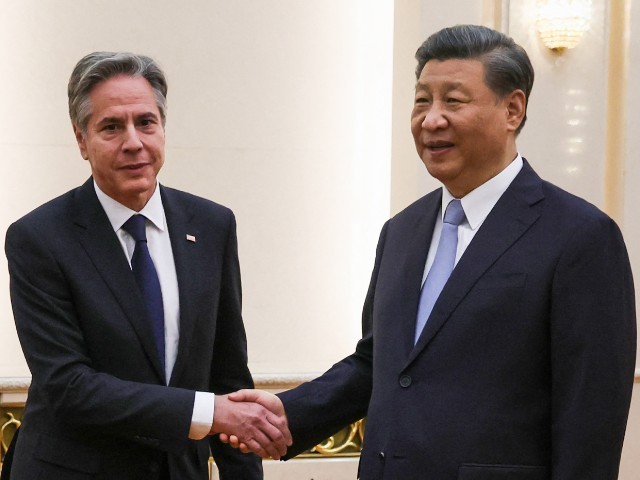
US Secretary of State Antony Blinken (L) shakes hands with China’s President Xi Jinping at the Great Hall of the People in Beijing on June 19, 2023 (LEAH MILLIS/POOL/AFP via Getty Images).
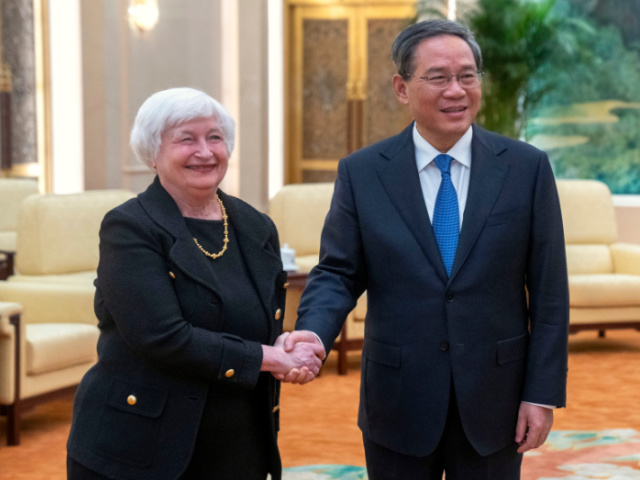
Chinese Premier Li Qiang, right, shakes hands with Treasury Secretary Janet Yellen, left, during a meeting at the Great Hall of the People in Beijing, China, Friday, July 7, 2023 (AP Photo/Mark Schiefelbein, Pool).
The meetings are the first since Blinken reportedly canceled a scheduled trip to Beijing in February as a result of the discovery of a Chinese surveillance vessel flying over military sites in the continental United States. Outraged Communist Party officials insisted the aircraft, a balloon, was a “civilian” meteorological vessel that had lost its way, though subsequent reports identified it as a surveillance balloon.
John Kerry has repeatedly claimed that cooperation with China – the world’s worst carbon emitter and a prolific consumer of fossil fuels – is more important than many other diplomatic concerns and urged that America subsidize China’s solar industry, fueled by Uyghur slavery tied to the ongoing genocide of the ethnic group in occupied East Turkistan. China has imprisoned as many as three million Uyghur, Kazakh, Kyrgyz, and other non-Han people in concentration camps since 2017, thousands of whom Beijing claimed had “graduated” from the “vocational training centers” (concentration camps) into the Chinese job market. Human rights organizations and journalists have documented the existence of a vibrant, state-sponsored online slave trade selling concentration camp “graduates” into factories nationwide.
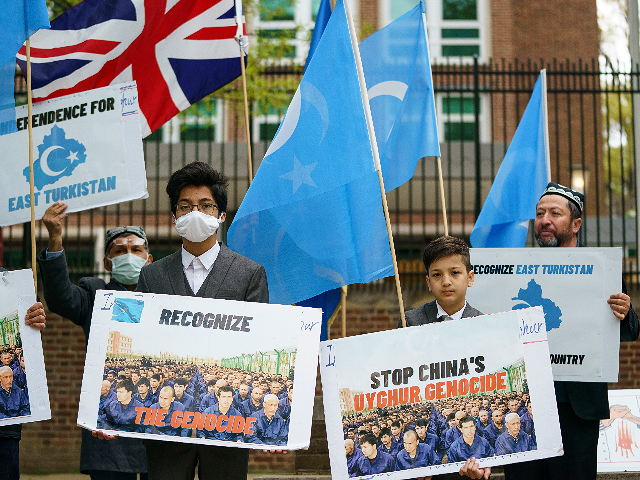
Supporters of the East Turkistan National Awakening Movement rally in front of the British Embassy in Washington, DC (Photo by Drew Angerer/Getty Images).
On Sunday, in Beijing, Kerry praised China for its alleged “incredible job” in building one of the world’s largest “renewable” energy industries, dominated by the slave-backed manufacture of solar panels and their separate parts.
“In the next three days, we hope we can begin taking some big steps that will send a signal to the world about the serious purpose of China and the United States to address a common risk, threat, challenge to all of humanity, Kerry said, according to the Washington Post, “created by humans themselves.”
According to the Post, Kerry met with the special representative for Climate Change Affairs, Xie Zhenhua, on Monday. The Chinese Foreign Ministry declined to offer details about the meeting on Monday but claimed the conversations would be “in-depth” and result in tangible attempts to “meet challenges” involving the alleged climate “crisis.”
“Climate change is a common challenge facing humanity. As agreed by China and the US, US Special Presidential Envoy for Climate John Kerry will visit China from July 16 to 19,” Foreign Ministry spokeswoman Mao Ning told reporters on Monday, adding:
The Chinese side will act in the spirit of the meeting between the two heads of state in Bali, have in-depth exchange of views with the US side on issues related to climate change, and work with the US to meet challenges and enhance the well-being of people in the world and the generations to come.
The Bali meeting between Xi and Biden at the G20 summit in November occurred in the aftermath of former House Speaker Nancy Pelosi’s (D-CA) visit to Taiwanin 2022, which outraged Beijing and resulted in Communist Party officials cutting off all climate communication with Washington. Taiwan is a sovereign state off the coast of China that the Communist Party illegally claims as a “province” of Beijing, despite having no authority over the country. The United States does not recognize Taiwanese sovereignty but maintains friendly relations with Taipei, which Beijing regularly pressures Washington to cut off.
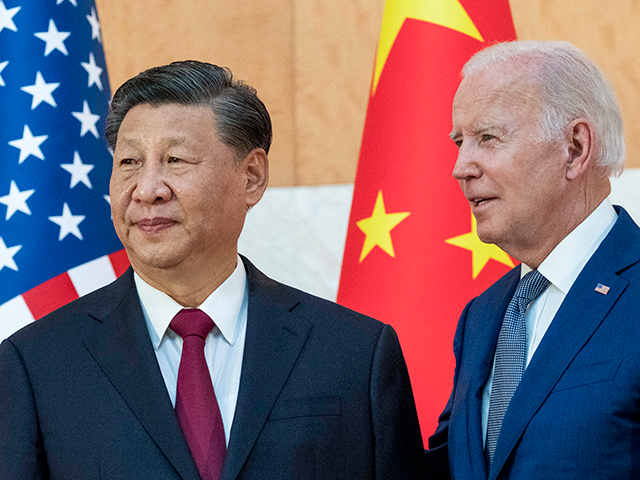
U.S. President Joe Biden, right, stands with Chinese President Xi Jinping before a meeting on the sidelines of the G20 summit meeting, Monday, Nov. 14, 2022, in Bali, Indonesia (AP Photo/Alex Brandon).
While the Foreign Ministry so far has not commented on Kerry’s visit, the government-owned Global Times predicted his meetings would yield no significant results as his plane landed in the Chinese capital.
“Chinese observers expected that little, if any, concrete progress will yield from the talks,” the state newspaper declared under an article whose title predicted “no concrete progress expected” at all.
“Observers were widely pessimistic that Kerry’s visit will yield any substantial result for climate change cooperation between the two countries,” the article continued, contending the main reason is the fact that “Beijing and Washington disagree on the fundamentals of how to address climate change.”
The main disagreement highlighted is that China’s “fundamentals of how to address climate change” include browbeating the United States into paying poor countries, presumably to decrease their emissions. American officials, instead, note that China is by far the world’s worst polluter. In addition to being the world’s most prolific carbon emitter, China is responsible for prodigious amounts of garbage dumped in both the Pacific and Atlantic Oceans. In 2020 – a year during which carbon emissions around the world were reduced as Wuhan coronavirus lockdowns shut down commerce – China built three times the number of coal plants of every other country combined.
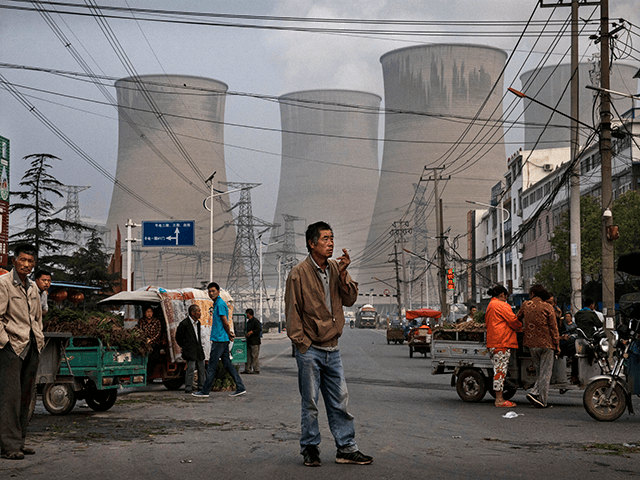
Chinese street vendors and customers gather at a local market outside a state-owned coal-fired power plant near the site of a large floating solar farm project under construction by the Sungrow Power Supply Company in Huainan, Anhui province, China (Kevin Frayer/Getty Images).
In an editorial on Sunday, the Global Times insisted that cooperation with America on “climate change” was impossible without taking into consideration other critical political topics, such as China’s human rights atrocities and crimes against the United States, prominently including intellectual property theft and espionage.
“There is actually no way to separate bilateral cooperation on global warming from the broader context of China-US relations,” the Global Times predicted. “This is because climate cooperation, which is prone to be politicized and involves industrial competition in such sectors as new energy, cannot be immune to the general direction of China-US relations.”
China’s dominance of solar panel manufacturing has proven a particular point of dispute due to China’s insistence on using slaves in manufacturing polysilicon, critical for the development of photovoltaic (PV) technology. Reports last year following the implementation of the Uyghur Forced Labor Protection Act (UFLPA) revealed that American companies attempting to import solar panels were struggling to find products from China they could prove were not built by slaves. The UFLPA treats all products from East Turkistan by default as if they were produced by slavery; the burden of proof is on importers to show that the products they wish to bring into America were not manufactured by slaves.
The Wall Street Journal revealed frustration in August as the UFLPA forced U.S. Customs to seize shipments from multiple top Chinese solar panel manufacturers, leaving the shipments languishing in storage while companies attempted to bring them into the United States. East Turkistan manufactures about 41 percent of polysilicon, making it a major force in the industry.
“Because the panels may have to sit in warehouses for months while companies negotiate with customs officials, some suppliers are choosing to take back the shipments and send them elsewhere,” the newspaper noted.
Kerry has been among the Biden administration’s loudest voices demanding an easier path for Chinese solar products into the American market despite slavery concerns.
“There are solar panels piled up at docks in Asia waiting for shipment, and they can’t be shipped, which is slowing down our ability to be able to deploy, even in our country, and elsewhere,” Kerry said in an interview with Bloomberg in September, a month after the Wall Street Journal depicted a similar situation, “We need to get our trade policy aligned in a way that can work better. But that has to be negotiated, and you’ve got to sit down and find a way to begin to communicate on that. So, hopefully, that will happen.”
“As I said, we are prepared, President Biden has made a commitment to President Xi, which he’s absolutely prepared to keep today, tomorrow; we’re prepared to negotiate and work with China on climate in order to try to advance the world’s interests,” he said at the time.
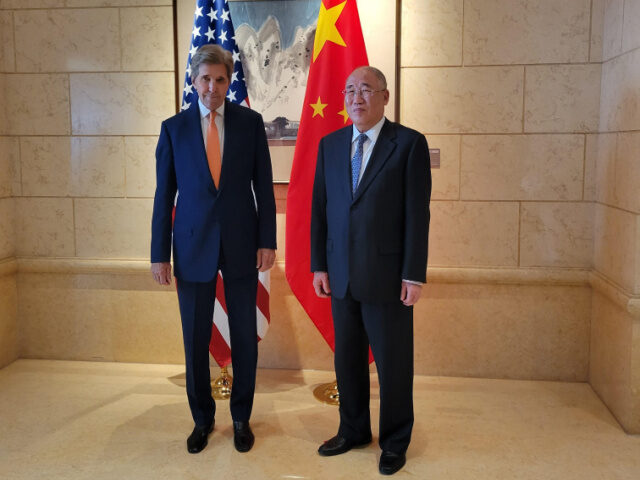
COMMENTS
Please let us know if you're having issues with commenting.